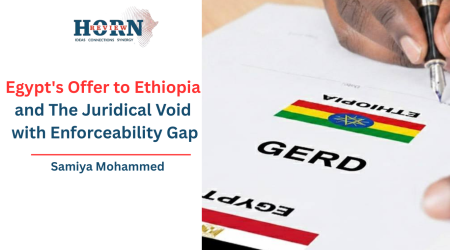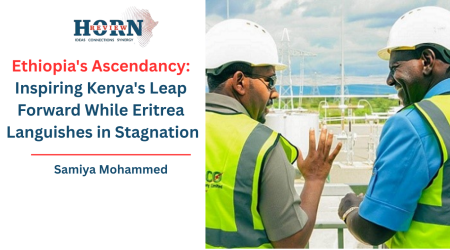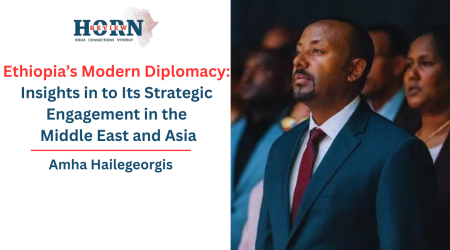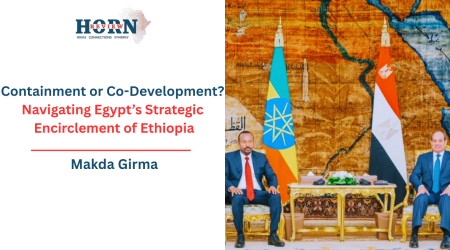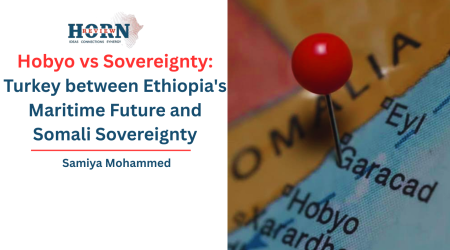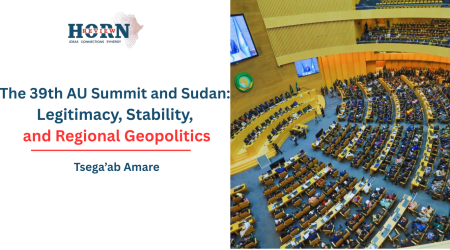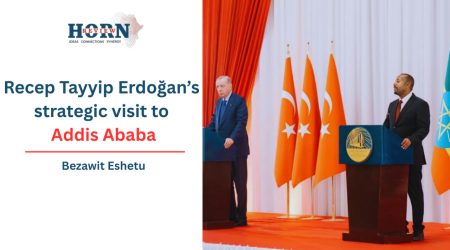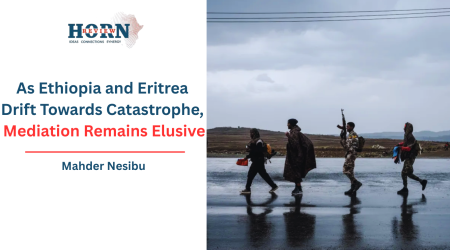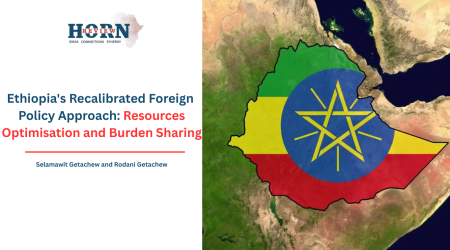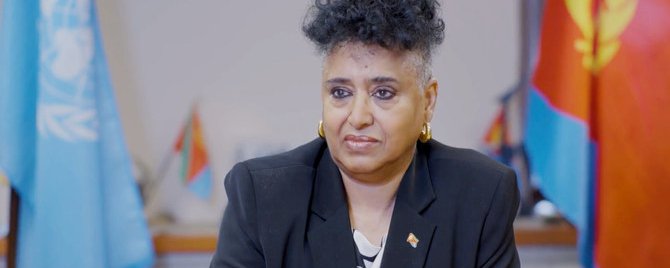
20
Sep
Ethiopia’s Maritime Debate: Rational Strategy, Misunderstood By Eritrean Rhetoric
Recent pronouncements by Eritrean officials, including the Ministry of Information and Ambassador Sophia Tesfamariam to the United Nations, have amplified activist narratives portraying Ethiopia’s deliberations regarding maritime access as reckless adventurism and a destabilizing force in the region. While rhetorically emphatic, these statements epitomize a persistent feature of Eritrean diplomacy: a predilection for alarmist posturing, authoritarian reflexes, and selective narratives, rather than engagement grounded in reasoned analysis, legal principles, or constructive negotiation. Too often, Eritrea transposes the rigid modalities of its domestic governance onto the international arena, converting bilateral and multilateral forums into stages for declaratory pronouncements rather than deliberative diplomacy.
Ambassador Tesfamariam dismissed Ethiopia’s reference to “geographical encapsulation,” asserting that the nation, bordered by six neighbors, cannot plausibly be considered constrained. She also invoked the distinction between ownership of a port and mere access, implying that Ethiopia should be content with transit arrangements. This characterization, however, neglects the strategic and logistical imperatives confronting a polity of Ethiopia’s magnitude.
The Ambassador further contended that Ethiopia’s maritime discourse constitutes a threat not only to Eritrea but to Kenya, Somalia, Sudan, South Sudan, and Djibouti. This interpretation mischaracterizes Ethiopia’s consistent engagement in regional integration, which has included cross-border infrastructure, trade corridors, and energy interconnections designed to generate mutual benefit. Eritrea, in contrast, has frequently declined to participate in regional initiatives, impeded cooperative projects, and amplified narratives of fear and suspicion. To cast Ethiopia as a regional threat obscures the substantive record of cooperative engagement and constructive policy initiatives the country has undertaken since 2018 under its “Horn First” foreign policy framework. Ethiopia’s approach seeks integration, stability, and shared prosperity – not dominance or coercion.
Criticism of Ethiopia’s rhetoric as “theatrical,” including metaphors such as “geographical prisoners,” also overlooks the distinction between expressive political language and substantive policy. Metaphor in this context serves to convey strategic realities, not to advocate for aggression. Dismissing the message because of linguistic flourishes misapprehends Ethiopia’s intentions and risks diverting attention from the substantive legal and strategic arguments underpinning its policy.
Furthermore, the Ambassador’s assertion that the future lies solely in trade corridors and infrastructure intentionally disregards Ethiopia’s demonstrable commitment to these very initiatives. Since 2018, Ethiopia has actively pursued regional connectivity, trade integration, and infrastructure development, whereas Eritrea has often obstructed or disengaged from these collaborative endeavors. Respecting Ethiopia’s maritime interests is thus indispensable to achieving the regional integration the Ambassador ostensibly champions.
Eritrea’s selective and inconsistent engagement on the international stage further underscores the limitations of its diplomatic approach. The Eritrean President has publicly endorsed Russia’s annexation of Crimea and eastern Ukraine, framing such actions as historically justified and necessary to counter perceived Western strategic suffocation of Russia. Eritrean officials have repeatedly abstained from or opposed United Nations resolutions condemning Russia’s control of these territories.
In stark contrast, Eritrea has responded with alarm to Ethiopia’s measured, dialogue-driven, and peaceful consideration of sovereign maritime access. This asymmetry highlights a pattern of selective principle and opportunistic rhetoric that undermines Eritrea’s credibility as a consistent actor in international diplomacy. demographic trajectory, and economic ambition. Ethiopia’s population currently approximates 135 million and is projected to expand substantially over the coming decade, generating concomitant demands for energy, trade, and infrastructure.
The recent inauguration of the Grand Ethiopian Renaissance Dam (GERD) has markedly enhanced national energy production, enabling both domestic development and potential export capacity. For a nation of this scale, reliance on coastal neighbors for the entirety of import-export operations imposes vulnerabilities that are politically, economically, and strategically untenable. Access to the sea transcends geography; it implicates sovereign control over trade, national security imperatives, logistical efficiency, and regional stability. Historical experience underscores this necessity: Ethiopia’s reliance on foreign ports has repeatedly rendered it vulnerable to leverage, obstruction, and supply insecurity.
A stark illustration occurred during the 1977 Ogaden War, when military imports were effectively held hostage in Djibouti’s ports, precipitating profound political and security upheaval within the country. This episode left a lasting imprint on Ethiopia’s strategic calculus, including its posture during the Cold War. Securing reliable, sovereign or semi-sovereign maritime access is therefore a measured and prudent policy, not an act of adventurism.
Moreover, while formal sovereignty over a port confers specific rights, Ethiopia has never asserted a particular official claim over Assab, Massawa, or any specific port facility in the region. Acknowledging historical precedent is nonetheless legitimate: prior to Eritrea’s secession in 1993, Ethiopia enjoyed sovereign access to Assab and maintained a substantive naval presence in the Red Sea and Gulf regions. Recognition of this historical reality is neither bellicose nor revisionist; it is a factual acknowledgment that informs strategic foresight.
Exclusive reliance on transit through foreign ports exposes Ethiopia to operational inefficiencies, political contingencies, and vulnerability to external pressure. Exploring secure, lawful, and cooperative arrangements that preserve sovereign oversight is therefore a rational and forward-looking measure.
Taken collectively, the statements issued by Eritrean officials reveal a border deficit in Eritrea’s diplomatic practices, and a consistent pattern of rhetorical posturing, obstruction and misrepresentation in lieu of engagements grounded in facts, law and reason. Hence rather than approaching Ethiopia’s maritime considerations with measured analysis and constructive dialogue, Eritrea relies on dramatized interpretations and selective framing that obscure the practical realities at stake.
Ethiopia’s pursuit of sovereign or semi-sovereign maritime access is not expansionist or nostalgic; it is a calculated, pragmatic policy, grounded in history, operational efficiency, national and regional security, and the needs of a rapidly growing population and economy. This approach complements regional integration efforts and adheres to international legal norms, and it should be recognized as a legitimate, forward-looking policy discussion rather than a destabilizing threat.
In juxtaposition, Ethiopia’s approach embodies dialogue, cooperation, and law-based solutions, whereas Eritrea frequently projects rigidity, mistrust, and obstruction. The Eritrean leadership’s attempts to present itself as the advocate of small or marginalized states to Western audiences, while simultaneously endorsing assertive territorial actions by global powers elsewhere, reveal a pattern of inconsistency and selective principle. For the Horn of Africa to realize its developmental potential, constructive engagement must supplant fear-driven rhetoric, historical realities must be contextualized rather than sensationalized, and legitimate policy discussions – such as Ethiopia’s maritime strategy – must be treated with the seriousness they merit. Ethiopia has demonstrated readiness, strategic foresight, and a commitment to law-based solutions; the critical question remains whether Eritrea will transcend authoritarian reflexes and embrace diplomacy in its most substantive and credible form.
By Horn Review Editorial

